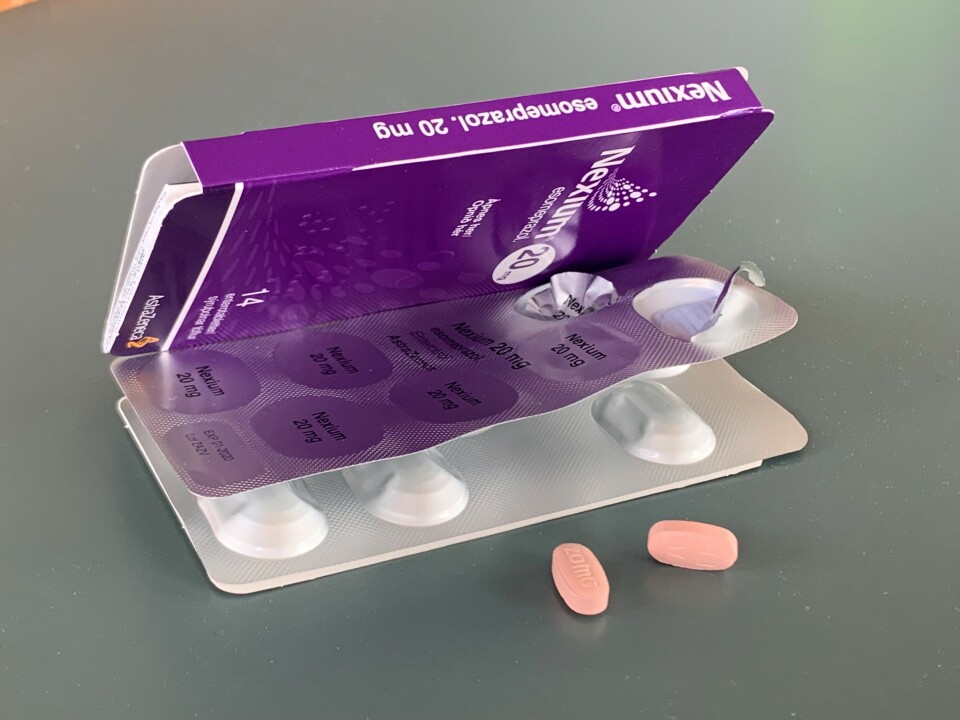
Are stomach acid-reducing pills dangerous?
Several studies hint that stomach acid-inhibiting drugs are linked to serious illnesses such as cancer and dementia. But what do we actually know for certain?
Proton pump inhibitors (PPIs) are medicines that prevent the stomach from producing acid, thereby increasing the pH level of gastric juices. This can help with health problems such as bleeding ulcers and oesophagitis.
PPIs generally have few side effects and are considered safe.
Sales of these medications have increased enormously since they were first approved for use in the late 1980s. Today, such medications, like esomeprazole (Nexium), are prescribed annually to over 600,000 people in Norway, presumably often completely unnecessarily.
In recent years, however, there have been a number of studies that suggest that there may still be problems associated with PPIs, especially with long-term use.
Studies have shown, for example, that people taking PPIs have a higher risk of osteoporosis, intestinal infections, lung infections, stomach cancer, cardiovascular diseases, dementia, and early death.
Studies are contradictory
The list of possible side effects can seem alarming. But the picture is far from clear. There have also been studies that do not find any association with diseases such as dementia.
A recent study of American veterans showed no significant link between the use of PPIs and the risk of any of the feared diseases.
So, are proton pump inhibitors dangerous or not?
Professor Reidar Fossmark from the Norwegian University of Science and Technology (NTNU) and his colleagues are currently studying the use of PPI.
He explains why it is so difficult to get definitive answers. And why there may still be reason to suspect that proton pump inhibitors are not quite as harmless as first thought.
Time-limited gold standard
The problem simply lies in how we study the adverse effects of medicines.
When a medicine is to be approved, the pharmaceutical company must provide documentation that the drug is effective and not harmful.
This documentation comes from human experiments, where some participants have received the medication, while others have received a placebo. This is the gold standard in medical research.
But such trials are often short-term – typically a few weeks or months.
So what if you want to know if the medicine has negative long-term effects? It’s not ethical or practical to run year-long experiments in which a group of randomly selected patients must use the medications.
Instead, researchers have to conduct observational studies.
A jungle of studies
In such studies, they examine what happens to the health of people who have taken the medication over time, compared to those who do not use it. This allows them to find links between medications and conditions that appear later.
It is precisely studies like these that have shown that people who use PPIs more often get certain diseases.
“There's a jungle of studies that have reported links between PPIs and all sorts of conditions,” says Fossmark.
The problem is that we don't know if it was the pills that caused these conditions.
Are PPIs to blame? Or was it diet? Or other illnesses?
The risk of getting a disease is influenced by many factors, such as smoking, diet, place of residence, social and economic situation, genetic predispositions, and other diseases. Often, these factors are interconnected in complicated ways.
A difficult social and economic situation can, for example, increase the risk both of you smoking and of having a poor diet. Your diet can increase the risk of obesity, and both obesity and smoking increase the risk of various conditions, such as heart disease and reflux disease – which are in turn treated with PPIs.
So if you use PPIs and end up with heart problems – was it the meds that caused it? Or was it the obesity or smoking? Or could there have been other lifestyle factors that we haven't even recorded or thought about?
It is quite likely that those who take PPIs as a group have poorer health than people who do not, and it can be difficult to adjust for all these other conditions in observational studies, Fossmark believes.
In the review he and his colleagues conducted in 2019, they conclude that the apparent connection between PPIs and osteoporosis and bone fractures is probably due to such other factors.
Still reason for suspicion
“It’s not possible to determine with complete certainty that long-term use of proton pump inhibitors causes disease,” says Guttorm Raknes, senior physician at the Regional Drug Information Centre (RELIS) in Northern Norway.
He and his colleague Trude Giverhaug wrote an op-ed about the problems related to PPIs in 2020 (link in Norwegian).
But despite the uncertainties, Raknes still believes there is reason to suspect that the pills can cause harm and that continuous use should be avoided if possible.
In some cases, the correlations from the observational studies point in the same direction as results from other types of studies, such as studies on animals or on mechanisms in human cells.
This is the case with the connection between PPIs and stomach cancer.
Pointing in the same direction
When gastric juice becomes less acidic, the body reacts by producing the substance gastrin. Studies have shown that high levels of gastrin are linked to stomach cancer. There are both studies on cells that show how this can happen and experiments demonstrating that high levels of gastrin cause cancer in animals.
“We can therefore lend a bit more credence to the idea that proton pump inhibitors can actually increase the risk of stomach cancer,” says Fossmark.
At the same time, he notes that PPI treatment is important for preventing oesophageal cancer in some patients. For some, the danger of stopping the medication is clearly greater than the risk of taking it.
As for the link with dementia, there is still a lot of uncertainty. Studies have uncovered mechanisms that suggest PPI could cause dementia. But results from the observational studies are mixed. Some have not shown a connection, while others, such as a Danish study from 2023, link PPIs to dementia.
Knocks out important defence mechanisms in the body
Another issue is microorganisms.
One of the most important tasks of stomach acid is to kill a range of bacteria and other microorganisms that can harm the body. Along with the skin, acidic gastric juice is the most important first line of defence against infections.
Stomach acid can actually protect against microorganisms in both directions: It prevents pathogenic organisms from entering the intestine and also stops intestinal bacteria from moving up into the respiratory tract and lungs.
So what happens when this defence mechanism is destroyed?
It is foolish to believe that biological functions like stomach acid production can be removed without consequences, Helge Waldum and Tom Martinsen from NTNU wrote in Dagens Medisin in 2023 (link in Norwegian).
A thousand times more bacteria
“The amount of bacteria in the stomach probably increases a thousandfold when stomach acid is removed,” says Fossmark.
He explains that this can in turn lead to bacterial overgrowth in the small intestine and changes in the intestinal flora all the way down to the rectum.
“Observational studies have shown that proton pump inhibitors increase the risk of common intestinal bacterial infections such as salmonella and campylobacter. And this is supported by experiments in bacterial cultures that are exposed to more and less acid,” Fossmark says.
In addition to these quite probable connections, other possible links have also attracted the interest of NTNU researchers in recent years.
Parkinson's and Alzheimer's
Recent research results have hinted that microorganisms and infectious agents like prions may play a greater role than we thought in diseases such as Alzheimer's, Parkinson's, and ALS.
If so, perhaps stomach acid could be even more important than we thought?
Research has, for instance, suggested that Parkinson's may be caused by microorganisms being transported to the brain via the vagus nerve – a strong nerve connection between the gut and the head.
“Interestingly, it has been shown that patients who have had their vagus nerve severed have a lower risk of developing Parkinson's disease,” he says.
Increased prion disease in mice
The research group at NTNU has also carried out animal experiments with a prion disease similar to the dreaded Creutzfeldt-Jakob disease – also known as mad cow disease.
They showed that stomach acid helped neutralise prions and prevent disease. But mice given proton pump inhibitors developed prion disease more often.
Such results indicate that we need more research on what the consequences of inhibiting stomach acid production might be.
At the same time, it is very important to remember that the results from animal and cell studies are not necessarily relevant for humans.
The knowledge we have today – after several decades of use throughout the world – indicates that proton pump inhibitors are quite safe medications.
“For you as an individual, it's quite unlikely that you will develop a disease because of a proton pump inhibitor,” says Raknes. “And for a few, the benefit will clearly outweigh the risks.”
References:
Fossmark et al. Adverse Effects of Proton Pump Inhibitors—Evidence and Plausibility, International Journal of Molecular Sciences, vol. 20, 2019. DOI: 10.3390/ijms20205203
Fossmark et al. Is empiric proton pump inhibition in patients with symptoms of extraesophageal gastroesophageal reflux justified?, BMC Gastroenterology, vol. 23, 2023. DOI: 10.1186/s12876-023-02945-7
Kurlander et al. Impact of large scale, multicomponent intervention to reduce proton pump inhibitor overuse in integrated healthcare system: difference-in-difference study, 2024. DOI: 10.1136/bmj-2023-076484
Raknes, G. & Giverhaug, T. Mer om problematiske protonpumpehemmere (More about problematic proton-pump inhibitors), RELIS, 2020.
Reimer et al. Proton-pump inhibitor therapy induces acid-related symptoms in healthy volunteers after withdrawal of therapy, Gastroenterology, vol. 137, 2009. DOI: 10.1053/j.gastro.2009.03.058
Waldum, H. & Martinsen, T.C. Uforstand å tro at biologiske funksjoner kan fjernes uten konsekvenser (Absurd to believe that biological functions can be removed without consequences), Dagens Medisin, 2023.
———
Translated by Nancy Bazilchuk
Read the Norwegian version of this article on forskning.no






































